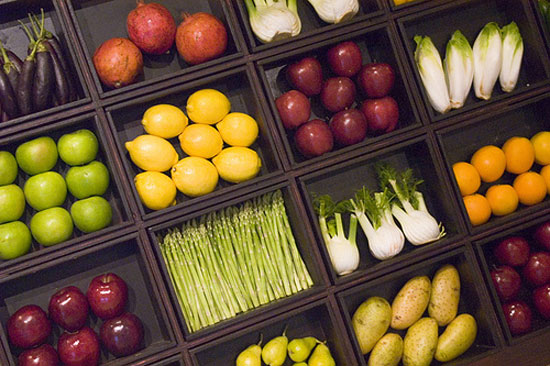
The burning question: local vs. imported. When we want to make the best food decision what should we choose? Recently, an oft-cited study from New Zealand that looks at the local food argument was updated (PDF) to include the full range of greenhouse gases. Lincoln University compared the energy used in the production and transport of four agricultural products: lamb, apples, onions, and milk.

Sometimes Imported Food is Better than Local
The original report concludes that it's better to buy lamb, apples and milk from New Zealand than from the U.K. -- even if you live in the U.K.
When storage wasn't considered, however, onions came out on top for U.K. buyers. When storage was thrown in, local U.K. onions did worse than New Zealand onions. This caused a big stir in the local food movement and the example is often touted by skeptics as proof that buying local is not the answer to our environmental woes.
When in the U.K., Buy Meat and Dairy Products From New Zealand
The report (although the original and the update do not follow internationally recognized ISO life cycle assessment methodology) concludes that meat and dairy products from New Zealand have less than a quarter of the impacts of meat and dairy from the U.K.
 Why you may ask? The 75% lower impact is mainly due to the pastures in New Zealand which require less fertilization (fertilizers are energy-intensive to produce) than those in the U.K. (and the U.S.). Additionally, New Zealand taps much more renewable energy than the U.K., making energy emissions cleaner and thus reducing the impacts from dairy production.
Why you may ask? The 75% lower impact is mainly due to the pastures in New Zealand which require less fertilization (fertilizers are energy-intensive to produce) than those in the U.K. (and the U.S.). Additionally, New Zealand taps much more renewable energy than the U.K., making energy emissions cleaner and thus reducing the impacts from dairy production.
The U.K. emits 3,472 kilograms of CO2 per tonne of milk solids produced compared to only 1,371 in New Zealand. The study shows that U.K. dairy farms produce 34% more greenhouse gas emissions than farms in New Zealand per kilogram of milk solid and 30% more per hectare.
It does seem however, that the report only includes shipping to the U.K. port. Shipping within the U.K. could cause a significant difference in the results, as truck transport has much higher emissions than sea transport. Sea freight is touted as the cleanest form of transport with only 1/60th of the emissions of air freight.
Consider Both the Season and a Product's Life Cycle
The point is buying local is not always a cut and dry issue: The terminology "food miles" over-simplifies the issue. Yes -- in the majority of instances you are much better off buying from local farmers and local products. But you also need to buy in season and consider the entire life cycle of the product.
This bigger life cycle picture considers cultivation and harvesting methods, fertilizers (buy organic!), water use, production processes, transportation (distance and mode of), distribution, refrigeration, packaging and, of course, the season. The U.K.'s Department for Environment, Food and Rural Affairs also agree that a single indicator based on food kilometers is an inadequate indicator of sustainability.
One of the problems with life cycle assessment is that people tend to make sweeping statements based on one study. This study does not mean that all products from New Zealand are more efficient when compared to the U.K. or that buying local isn't important. Nor does it mean that we can apply these conclusions to the U.S. or other countries. Each life cycle assessment looks at a specific scenario in a specific moment in time, so results aren't always transferable.
Think Before You Buy
There is no easy answer to this food dilemma except to think before you choose. Look at where your products come from, consider if it is in season, and think about how it was produced and how it got to that shelf. All of those things -- not just the distance -- are what we need to keep in mind to be responsible consumers.
It's a lot to think about when you do your grocery shopping, so when in doubt? Stick with local products that are in season.
Do you shop local? Comment below!
More From Treehugger on Food Miles and Eating Local
:: Misunderstanding Food Miles
:: Defra Study About Impact of 'Food Miles'
:: The Eco Diet Isn't Just About Food Miles
:: Eating Local Food: The Movement, Locavores and More
::Is Fresh and Local Always Greener?
::How Can We Eat Local All Year Long?
:: Treehugger's How to Green Your Meals Guide